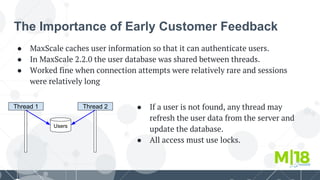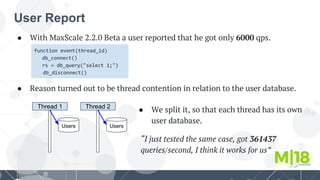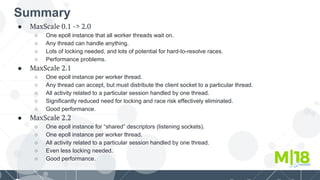MaxScale uses an asynchronous and multi-threaded architecture to route client queries to backend database servers. Each thread creates its own epoll instance to monitor file descriptors for I/O events, avoiding locking between threads. Listening sockets are added to a global epoll file descriptor that notifies threads when clients connect, allowing connections to be distributed evenly across threads. This architecture improves performance over the previous single epoll instance approach.





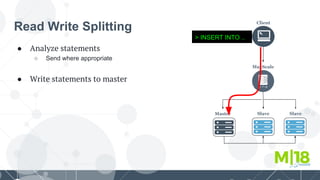
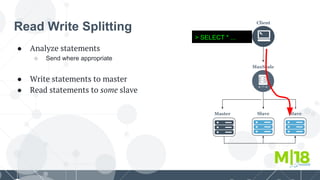
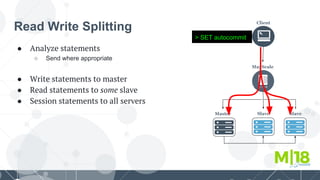

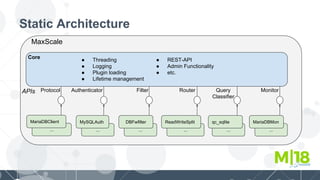
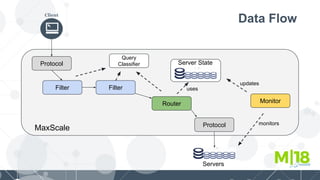
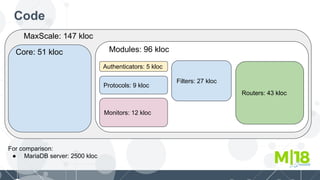
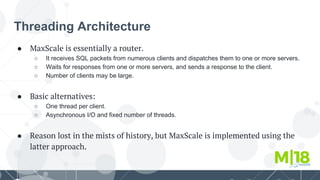
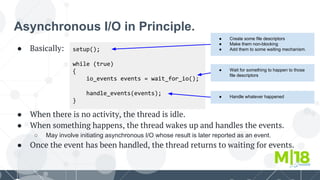
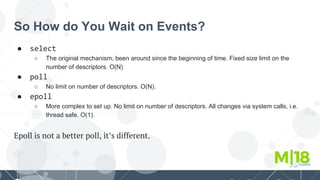
![MaxScale epoll Setup
● At startup, socket creation is triggered by the presence of listeners.
[TheListener]
type=listener
service=TheService
...
port=4009
so = socket(...);
...
listen(so);
...
struct epoll_event ev;
ev.events = events;
ev.data.ptr = data;
epoll_ctl(epoll_fd, EPOLL_CTL_ADD, so, &ev);
epoll_fd = epoll_create(...);](https://image.slidesharecdn.com/session4m18maxscalearchitectureandperformance-180306225456/85/M-18-Architectural-Overview-MariaDB-MaxScale-16-320.jpg)
![Client Connection
Client MaxScale
while (!shutdown)
{
struct epoll_event events[MAX_EVENTS];
int ndfs = epoll_wait(epoll_fd, events, ...);
for (int i = 0; i < ndfs; ++i)
{
epoll_event* event = &events[i];
handle_event(event);
}
}](https://image.slidesharecdn.com/session4m18maxscalearchitectureandperformance-180306225456/85/M-18-Architectural-Overview-MariaDB-MaxScale-17-320.jpg)
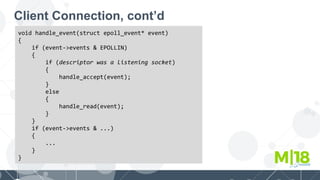
![Handle Accept
void handle_accept(struct epoll_event* event)
{
for (all servers in service)
{
int so;
connect each server;
struct epoll_event ev;
ev.events = events;
ev.data.ptr = data;
epoll_ctl(epoll_fd, EPOLL_CTL_ADD, so, &ev);
}
}
[TheService]
type=service
service=readwritesplit
servers=server,server2
...](https://image.slidesharecdn.com/session4m18maxscalearchitectureandperformance-180306225456/85/M-18-Architectural-Overview-MariaDB-MaxScale-19-320.jpg)
![Handle Read
void handle_read(struct epoll_event* event)
{
char buffer[MAX_SIZE];
read(sd, buffer, sizeof(buffer));
figure out what to do with the data
// - wait for more
// - authenticate
// - send to master, send to slaves, send to all
// ...
...
}
● When the servers reply,
the response will be
handled in a similar
manner.](https://image.slidesharecdn.com/session4m18maxscalearchitectureandperformance-180306225456/85/M-18-Architectural-Overview-MariaDB-MaxScale-20-320.jpg)
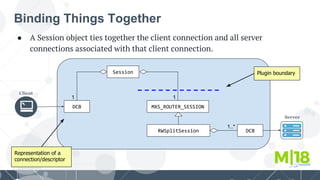
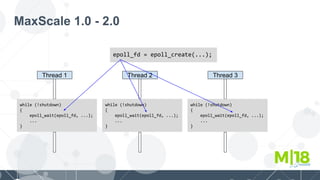
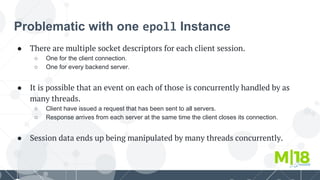
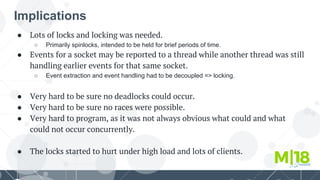
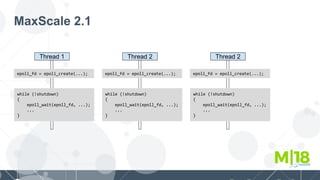


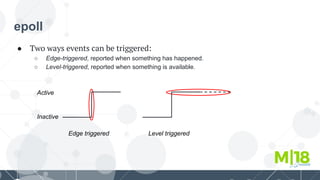
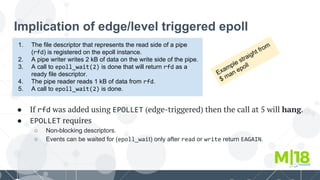
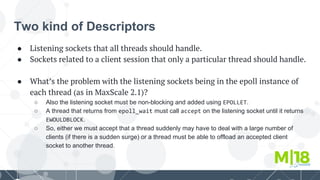
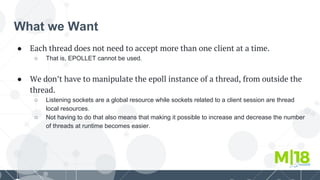
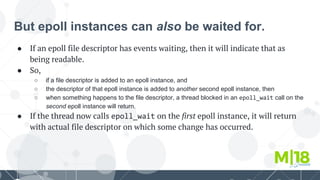
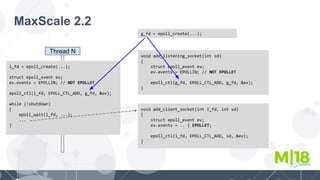
![Client Connecting
typedef void (*handler_t)(epoll_event*);
while (!shutdown)
{
struct epoll_event events[MAX_EVENTS];
int ndfs = epoll_wait(epoll_fd, events, ...);
for (int i = 0; i < ndfs; ++i)
{
epoll_event* event = &events[i];
handler_t handler = get_handler(event);
handler(event);
}
}
void handle_epoll_event(epoll_event*)
{
struct epoll_event events[1];
int fd = get_fd(event); // fd == g_fd
epoll_wait(fd, events, 1, 0); // 0 timeout.
epoll_event* event = &events[0];
handler_t handler = get_handler(event);
handler(event);
}
void handle_accept_event(epoll_event* event)
{
int sd = get_fd(event);
while ((cd = accept(sd)) != NULL)
{
...
add_client_socket(cd, ...);
}
}](https://image.slidesharecdn.com/session4m18maxscalearchitectureandperformance-180306225456/85/M-18-Architectural-Overview-MariaDB-MaxScale-34-320.jpg)
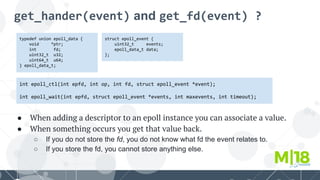
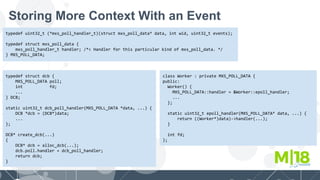
![Adding and Extracting Events
void poll_add_fd(int fd, uint32_t events, MXS_POLL_DATA* pData)
{
struct epoll_event ev;
ev.events = events;
ev.data.ptr = pData;
epoll_ctl(m_epoll_fd, EPOLL_CTL_ADD, fd, &ev);
}
DCB* dcb = ...;
poll_add_events(dcb->fd, ..., &dcb->poll);
Worker* pWorker = ...;
poll_add_events(pWorker->fd, ..., pWorker);
while (!should_shutdown)
{
struct epoll_event events[MAX_EVENTS];
int n = epoll_wait(epoll_fd, events, MAX_EVENTS, -1);
for (int i = 0; i < n; ++i)
{
MXS_POLL_DATA* data = (MXS_POLL_DATA)events[i].data.ptr;
data->handler(data, ..., events[i].events);
}
}
Each worker thread sits in this loop.](https://image.slidesharecdn.com/session4m18maxscalearchitectureandperformance-180306225456/85/M-18-Architectural-Overview-MariaDB-MaxScale-37-320.jpg)



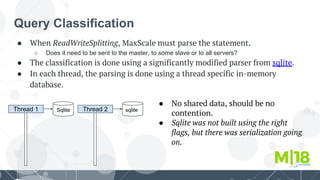
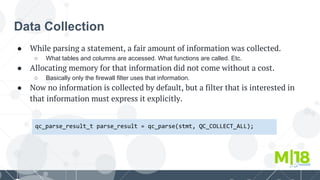
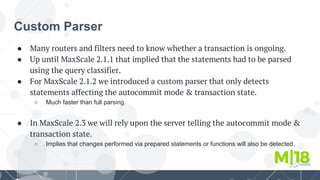

![Cache
● The cache was introduced in 2.1.0 but the
performance was less than satisfactory.
● Problem was caused by parsing.
○ The cache parsed all statements to detect non-cacheable statements.
○ E.g. SELECT CURRENT_DATE();
● Added possibility to declare that all SELECT statements are cacheable.
[TheCache]
type=filter
module=cache
...
selects=assume_cacheable
● Huge impact on the performance.](https://image.slidesharecdn.com/session4m18maxscalearchitectureandperformance-180306225456/85/M-18-Architectural-Overview-MariaDB-MaxScale-45-320.jpg)

